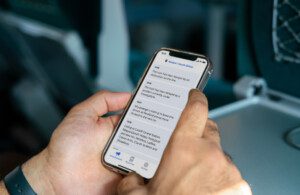Every year the world unites to shine a light on the importance of digital access and inclusion for disabled passengers. This year, Global Accessibility Awareness Day takes place on May 15, sparking conversations around public transport accessibility and how we can build a digital world that works for everyone.
At Icomera, accessibility isn’t a one-day conversation. It’s embedded in how we think, design, and innovate. Our mission is simple: to ensure that everyone, no matter their ability, age, or background, can travel independently with confidence.
Why Accessibility in Public Transport Travel Matters for disabled people?
According to the World Health Organisation (WHO), 1 billion people, or 15% of our population, live with a disability. 24.6 million adults in the United States report having a travel-limiting disability and in the UK, more than 60% of people with accessibility needs struggle or avoid making independent journeys altogether. The knock-on effect? Missed appointments, reduced access to work and education, and a cost to people and national economies.
At Icomera, we have a responsibility and an opportunity to create systems that include, not exclude. We believe digital innovation plays a vital role in reducing barriers and opening up the world for everyone.
We’re proud to support transport operators around the world with award-winning solutions that improve accessibility in real-time, using passengers’ own smart devices.
Here’s how Icomera’s solutions support public transport accessibility in 2025
Visor: Guided Navigation for Passengers with Sight Loss barriers
Developed in collaboration with the Royal National Institute of Blind People (RNIB), Visor uses bright, easy-to-scan Navilens BIDI codes and real-time data to guide passengers through stations and vehicles.
- Codes scannable with a smart device from up to 30 metres away
- Automatically updates with live journey information
- Works in multiple languages
- Empowers passengers with autonomy and confidence
Whether it’s navigating a busy platform or locating a ticket machine, Visor is transforming the experience for blind and partially sighted passengers, people with autism and tourists and the technology has already been deployed in London, Barcelona, New York and beyond.
Luna – Personalised Digital Signers
Sign languages are official languages that are often overlooked. Luna, developed in partnership with Signapse and integrated with Visor, is changing that.
Luna is a low-cost, smart application or web-based solution that translates digital information into British Sign Language (BSL) and displays it on a user’s smart device via a personalised digital signer – all without any extra hardware.
- Supports British Sign Language, American Sign Language, and more
- Includes text and audio announcements in up to 33 languages
- Ideal for deaf passengers, non-native speakers, and travellers using noise-cancelling headphones
- Particularly helpful during service disruptions when audio-only announcements dominate
With over 150,000 people in the UK relying on BSL, Luna addresses a vital need by ensuring passengers aren’t left behind, especially during critical moments.
HEAR – Personalised Announcements for Passengers with Hearing Loss
Developed with Hearing Link and Hearing Dogs, HEAR enables passengers to receive real-time onboard announcements directly to their mobile devices.
- Custom notifications and audio alerts
- Available in multiple languages
- Compatible with screen readers
- Announcement history and offline functionality

Whether someone has permanent hearing loss, a temporary impairment, or simply prefers to travel with headphones, HEAR makes journey updates accessible to all.
As we mark Global Accessibility Awareness Day, we believe that accessible transport should be the norm, not the exception. Whether it’s a visual impairment, hearing loss, language barrier, or simply needing a little extra help navigating an unfamiliar environment, we’re designing solutions that serve the whole journey, not just the average passenger.

